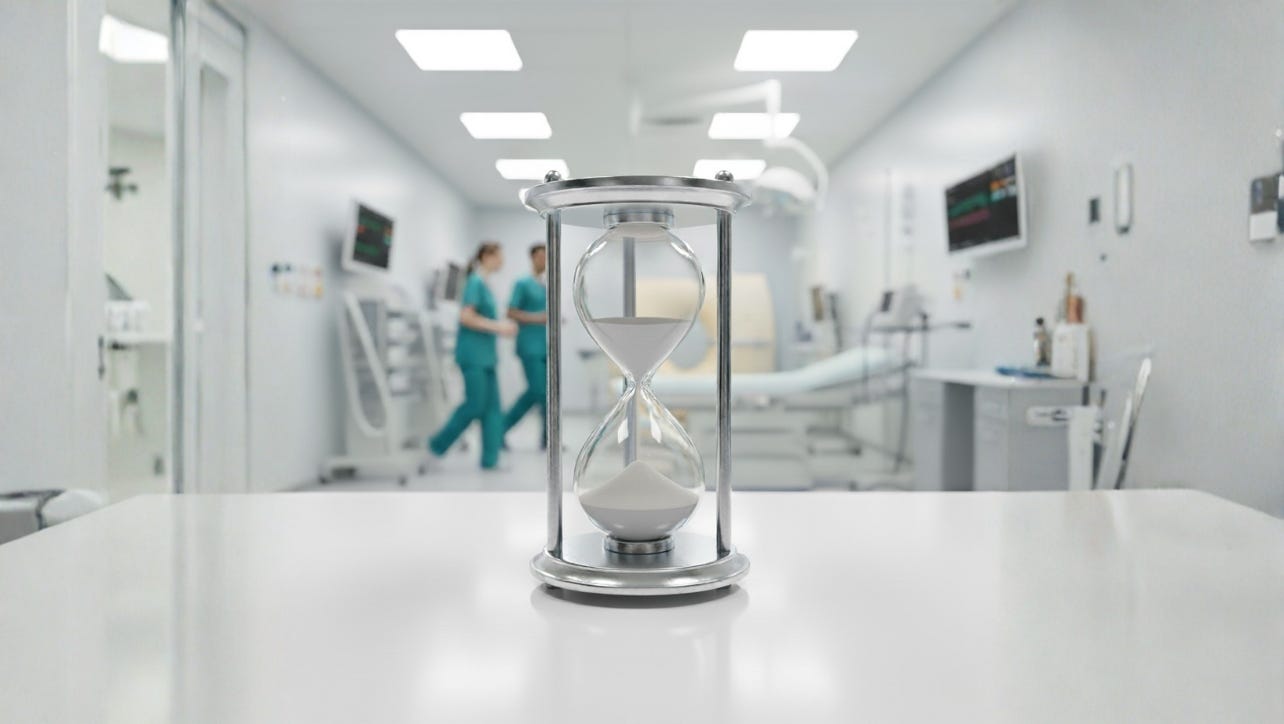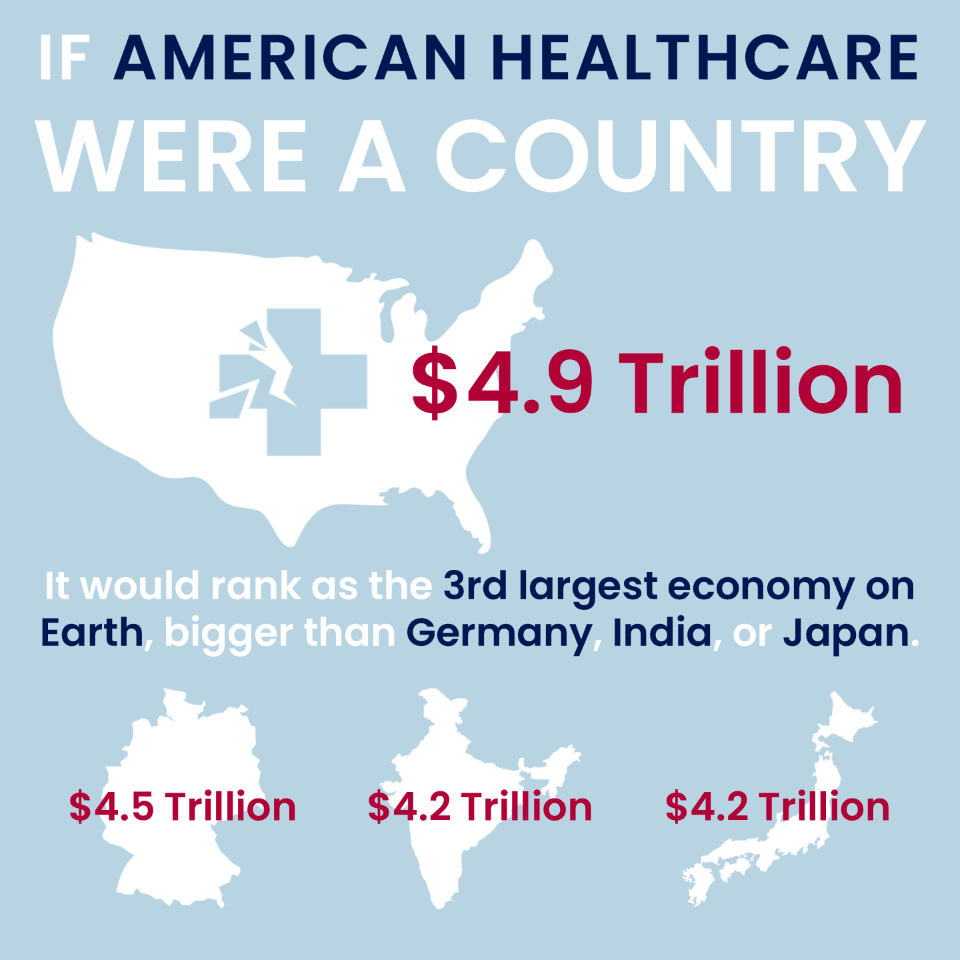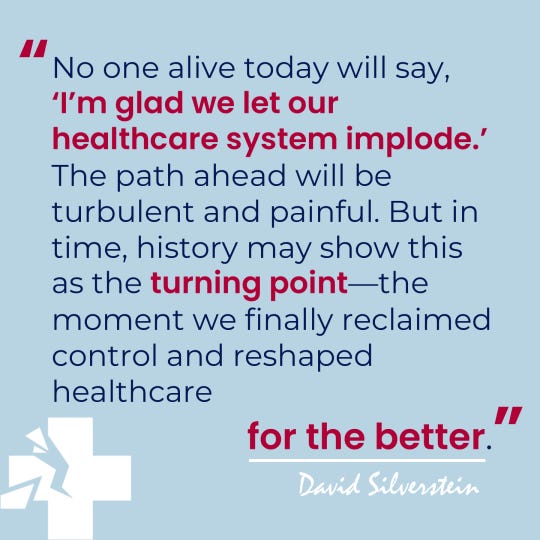The Free Market Is the Only Force That Can Fix American Healthcare
The reckoning America cannot avoid.
The time has come to call a spade a spade. While the conduct of the healthcare industry infuriates me, nothing is more maddening than the inane political banter and journalistic commentary that fails to talk about the real issue.
The issue is not corrupt insurance carriers, though they are truly corrupt. It’s not greedy, administratively bloated hospital systems, though they are undeniably greedy and bloated. Nor is it the dominance of “non-profits” that do in fact operate like for-profit enterprises.
The real problem is obvious, though we pretend it isn’t. The U.S. government cannot fix the problems that plague the American healthcare system.
The scale of the challenge
The American healthcare system is a $5 trillion economy unto itself, tightly entwined with a government that foots half the bill, at the expense of taxpayers. By most measures, U.S. healthcare is the third-largest economy on the planet, only behind the United States as a whole, and China. It’s bigger than the entire economies of Germany, Japan, and India. Think about that: we’re trying to engineer an economy that is larger than the economies of more than 95% of the countries on earth.
And yet, every election cycle, politicians promise to “fix healthcare” as if it were a pothole or a tax loophole. Journalists amplify these promises by asking politicians how they’ll do it. Yet they never ask the two most obvious questions:
Can it be done?
How can our government engineer a better healthcare system when it has never successfully engineered a better market for anything else?
The myth of legislative solutions
If we can successfully engineer a better healthcare system through legislation, can’t we also engineer better markets for automobiles, real estate, or food? Time and again, history proves we cannot. So why do we think healthcare is different? Does calling it “essential” give the government some unworldly power to fix it? Is it more important than food and shelter?
The Affordable Care Act (ACA) is a case study in this fallacy. While I believe the ACA was well-intentioned, it was so contrary to a market-based solution that it has led us to this most unstable place. It didn’t drive down costs, improve access, or enhance quality. What it did was add complexity, distort incentives, and accelerate consolidation—pushing a system that was already on the wrong path closer to collapse in the interest of political expediency.
The free market: History’s most powerful force
The free market is the most powerful force the world has ever known. It defeated Germany (twice), Japan, and the Soviet Union. It has lifted billions of people out of poverty and driven innovation at a pace no government could ever match. And yet politicians, and the people who elect them, seem to think that through sheer force of will, law, and executive action, they can fix the system.
It’s absurd.
Markets work because they harness decentralized decision-making. They reward efficiency and punish waste. They allocate resources based on value, not political influence. Government, by contrast, operates through central planning—a model that has failed everywhere it’s been tried.
The coming collapse
There is only one option, as distasteful as it may be: we must unleash the free market. Yes, it’s going to be messy; it’s going to take time; and I believe we are going to experience ten to twenty years of chaos, misery, and in many cases, lives cut short by a system that should have protected them.
However, it will be worse if we refuse to begin.
On its current trajectory, the system will all but collapse within 36 months. Costs are rising far faster than Gross Domestic Product (GDP). Employers are buckling under the weight of premiums. Government programs are consuming an ever-larger share of tax revenue. Hospitals are consolidating into regional monopolies. Insurers are gaming risk pools. And patients are drowning in debt. It is not sustainable.
When a system teeters on the edge, it doesn’t negotiate. It breaks, and when it does, the pain lands hardest on those who rely on it most. American healthcare is nearing that point of instability, and change is coming whether we like it or not.
Sacrifice and innovation
There have been many times in American history when we had to make great sacrifices. We fought World War II because not fighting would have been worse. We didn’t know what the cost would be, but we knew we had to fight. This is that kind of moment.
While I wholly object to pure destruction without a plan, the reality is that we cannot simply decree a better system. That’s not how markets work. We need innovation and experimentation, entrepreneurs willing to challenge entrenched incumbents, and employers willing to rethink benefits.
We also need Americans—a.k.a. consumers, who are empowered with knowledge, transparency, and choice.
This will not happen overnight. It will require courage, capital, and compassion. Fortunately, markets, when unleashed, have a way of transforming even the most entrenched systems, often with remarkable speed.
Yet there will be consequences. Just as I cannot imagine a single mother saying, in 1870, that “I’m so glad we fought that war. It cost me my husband and two of my three sons, but it was worth it.” Not one. Yet more than 150 years later, through only the eyes of history, we romantically talk about the sacrifices that held the union together and freed the slaves.
The same will be true here. No one alive today will say, ‘I’m glad we let our healthcare system implode.’ The path ahead will be turbulent and painful. But in time, history may show this as the turning point—the moment we finally reclaimed control and reshaped healthcare for the better.
What must happen now
We must stop waiting for Washington to fix it. There is no legislative miracle coming. Real change will come from the ground up with employers, innovators, consumers, and investors who refuse to accept the status quo.
Employers must stop buying blind. Demand line-of-sight into every dollar spent and steer members to care that delivers outcomes, not markups. Make managing healthcare as important as any other cost.
Innovators must build business models that reward better care, not more care — and be willing to compete on cost and results. Innovators innovate because markets provide opportunities and for no other reason.
Consumers must insist on knowing the truth: what care costs, what it delivers, and take ownership of their health decisions. Make the decision now to educate yourself and your family. Teach your children.
Investors must stop pouring money into consolidation and start backing those willing to tear down what’s not working. If ever there was a need for ethical investing, this is it!
The hard truth
Doctors are taught that their job is to relieve pain. Yet the hard truth is that fixing healthcare in America is going to hurt. It will threaten power and profit, and it won’t happen neatly. Yet doing nothing will be far worse. Millions depend on a system that’s failing them every day. Every delay, every excuse, every false promise keeps people trapped in a system that can’t deliver care, protect dignity, or sustain life—and too often, it bankrupts them for trying.
It’s time to stop waiting for a rescue. The free market is the only force strong enough to fix American healthcare, and the only one we haven’t truly tried.





